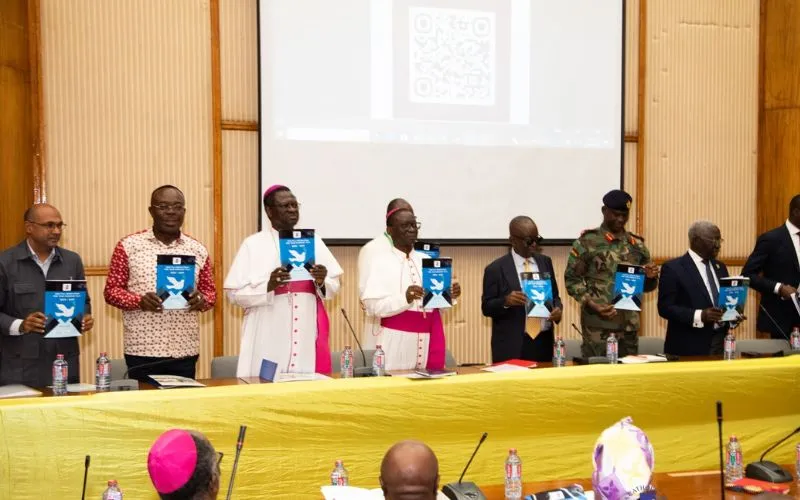The Minister of Ghana’s National Security has lauded members of the Ghana Catholic Bishops Conference (GCBC) for launching a five-year strategic plan that seeks to enhance peace in the West African nation and the wider Sahel Region.
In his keynote address during the July 30-31 Sahel Peace Initiative Forum held at the Accra International Conference Centre in the country’s capital city, Albert Kan-Dapaah described the strategic plan as “wonderful” and called for a collective effort to ensure its implementation.
“This initiative in Ghana—if ever there was a project that was extremely useful, most relevant, and very timely—in my opinion, it is this initiative, and I think we should give it all our support,” Minister Kan-Dapaah said on Tuesday, July 30, the first day of the event organized under the theme, “Building a more peaceful and cohesive Ghana: A collective endeavour.”
He added, “This is a wonderful initiative by the Catholic Church. I commend them, and in declaring it as launched, I want to urge all of you to support it in any way that you can. The document is accordingly launched.”
The Ghanaian minister for National Security emphasized the need to put aside differences and work together towards the shared objective of ensuring security if peace is to be achieved in Ghana and the wider region of West Africa and beyond.
“That is how I look upon this initiative, and that is why I commend this project, and that is why I believe all of you must be involved. We are making an appeal to institutions, the business community, and the religious bodies to come on board and help us,” Mr. Kan-Dapaah said.
In November 2019, delegates, who included Catholic Prelates and Clergy drawn from Bishops’ conferences in Burkina Faso, Niger, Mali, Ivory Coast, and Ghana convened the first-ever Inter-Conferences Workshop to discuss the security concerns in the African Sahel region, a region that spans 5,400 km encompassing Senegal, Mauritania, Mali, Burkina Faso, Niger, Nigeria, Chad, Sudan and Eritrea – the region had been facing rampant violence facilitated by political crisis in the countries, which were offering a fertile ground for the proliferation of extremist groups.
In their statement following the 12-13 November 2019 meeting in Burkina Faso’s capital city, Ouagadougou, the delegates outlined the role of some eight stakeholders in the process of ending the violence, including the perpetrators of the attacks, affected populations, Non-Governmental Organizations (NGOs), public authorities, diplomatic representation, international actors, and faith-based leaders and “Sister Episcopal Conferences”.
Participants in the two-day meeting that the Catholic Relief Services (CRS), the humanitarian arm of the United States Conference of Catholic Bishops (USCCB), organized appealed to faith-based leaders “to educate respect for human life, preserve religious freedom, human and spiritual values common to all men created by God and to promote interreligious dialogue.”
According to CRS, while Ghana and Ivory Coast are not part of the Sahel region, they were represented in the November 2019 meeting since “the region’s porous borders pose a real risk of the violence spreading to neighboring countries.”
“We reaffirm our commitment to collaborate with all people of good will so that in an emergency, we will put a stop to the killings and the displacement of the populations, that their causes are eradicated, that the victims are not abandoned on their own, but that their material, physical, psychosocial, and spiritual care is insured, and that work is committed to effective conflict prevention, and lasting peace and sustainable living, especially through the practice of dialogue, justice and reconciliation,” the delegates concluded their statement that the President of the Catholic Bishops in Burkina Faso and Niger and his counterpart in Mali co-signed.
In his Tuesday, July 30 keynote address, Minister Kan-Dapaah said that he finds it regrettable that insecurity in the Sahel region, particularly Burkina Faso, Niger, and Mali, is escalating and risking to jeopardize all peace efforts in the entire West African region.
“The intensity of the attacks and some of the things that are happening are just too bad,” he lamented, adding, “This month, so many people have been killed in Mali and Niger; so many people are being killed daily in Burkina Faso.”
The fact that a large portion of land in Burkina Faso is under the control of terrorists means a lot to the West African sub-region, the Ghanaian government official further lamented.
He warned that the ease with which the extremists are spreading spells doom for the entire region, and added, “I suspect that the same terrorists will attempt to move into Guinea from Mali due to their shared border. They will also try to enter Senegal, and once they succeed in infiltrating Guinea and Senegal, they could eventually take over the whole of West Africa.”
Ghana, Minister Kan-Dapaah went on to say, “remains at risk due to the strong determination on the part of the terrorist groups to expand their areas of operations southwest from the Sahel region to the coastal states along the Gulf of Guinea.”
Mr. Kan-Dapaah cautioned Ghanaian politicians in the country against incitement which he said is partly a recipe for violence and extremism.
There is a risk when politicians utter “divisive and inflammatory comments to advance their political interest without recourse to the imperatives of unifying our people in pursuit of a common goal of development,” he said July 30.



